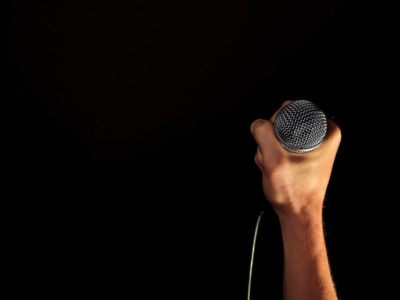When I arrived at UC Berkeley, I couldn’t wait to join the slam poetry club. I decided to put myself in the running of their slam-poet competition consisting of events throughout the semester. After a lot of hard work practicing and performing, I earned the chance to compete in the finals at the end of the semester.
Unfortunately, thinking the competition began an hour later than it actually did, I showed up late to the final event and missed the random competitor number draw. Random ordering of poets in a slam competition is important because the judges become noticeably more excited as the night goes on, affording an advantage to poets placed later in the lineup. Since I had missed the draw, I had a potentially unfair advantage, and the only way I could compete was with the approval of my fellow competitors. The competition’s M.C. gathered all of us in a circle outside the building.
“I just want to say that I’m sorry,” I said, my voice shaky. “It’s my first semester here, and I’m still getting used to things. Plus, I’m so nervous I can barely think straight.” Some people chuckled and I thought I was in the clear. I had messed up, but it wasn’t too bad. I could still perform.
“It’s funny, though,” said a woman to my left, “the politics of the situation.”
Everyone looked at her.
“It’s my first semester too,” she said. “I read the email, and I was here on time. But a white man can just show up whenever he wants, and the rules don’t apply.” The circle was silent. Everyone was clearly uncomfortable. I didn’t know how to respond. Nobody wanted to speak. So the woman continued, “I thought Berkeley was a place that fought privilege. We’re all performing poems about oppression, and this white man thinks he can just drop into the competition when he feels like it.”
In the end, I was barred from the competition. Months of hard work, nerves and determination thrown out the window, all because of my mistake. And yet, despite the fact that the poets were absolutely justified in excluding me from the competition, I couldn’t help but feel that I had been treated unfairly.
Don’t get me wrong, I do come from a place of privilege, a place where I normally never even think about these issues, because I don’t have to. I’ve never had to deal with racism or misogyny. I’ve never been made to feel ashamed of myself for my sexuality, or called a terrible name because of the texture of my hair.
But the bottom line is that I was barred from competing because of the color of my skin. If I weren’t white, I would have been allowed to compete. The majority of the poets understood that my being late had nothing to do with me being a white male. It was an honest mistake, borne of nerves and stupidity. Yet I was accused of acting deliberately, as if I had said to myself, “I can break all the rules because I’m white.”
All my life I’ve considered myself an ally, even before I knew what the word “ally” meant in this context. Furthermore, I’ve always felt more comfortable around artists than any other group, so to feel excluded from a community of poets was by far the worst college experience I have had so far.
On the other hand, how can I justify anger toward a group of people who have spent their entire lives oppressed by people who look and act like me? The woman who spoke against me has lived a life incredibly different from my own, and it would be an insult to her for me to even pretend to understand what her life has been like. The person I see in the mirror is completely different from the person she sees when she looks at me. The least I can do is listen to her opinion.
In the end I don’t regret showing up late, because it taught me a new perspective. It allowed me to see that not everyone perceives me as the ally I want to be. Sometimes our actions can have harmful consequences, despite our intentions.



















